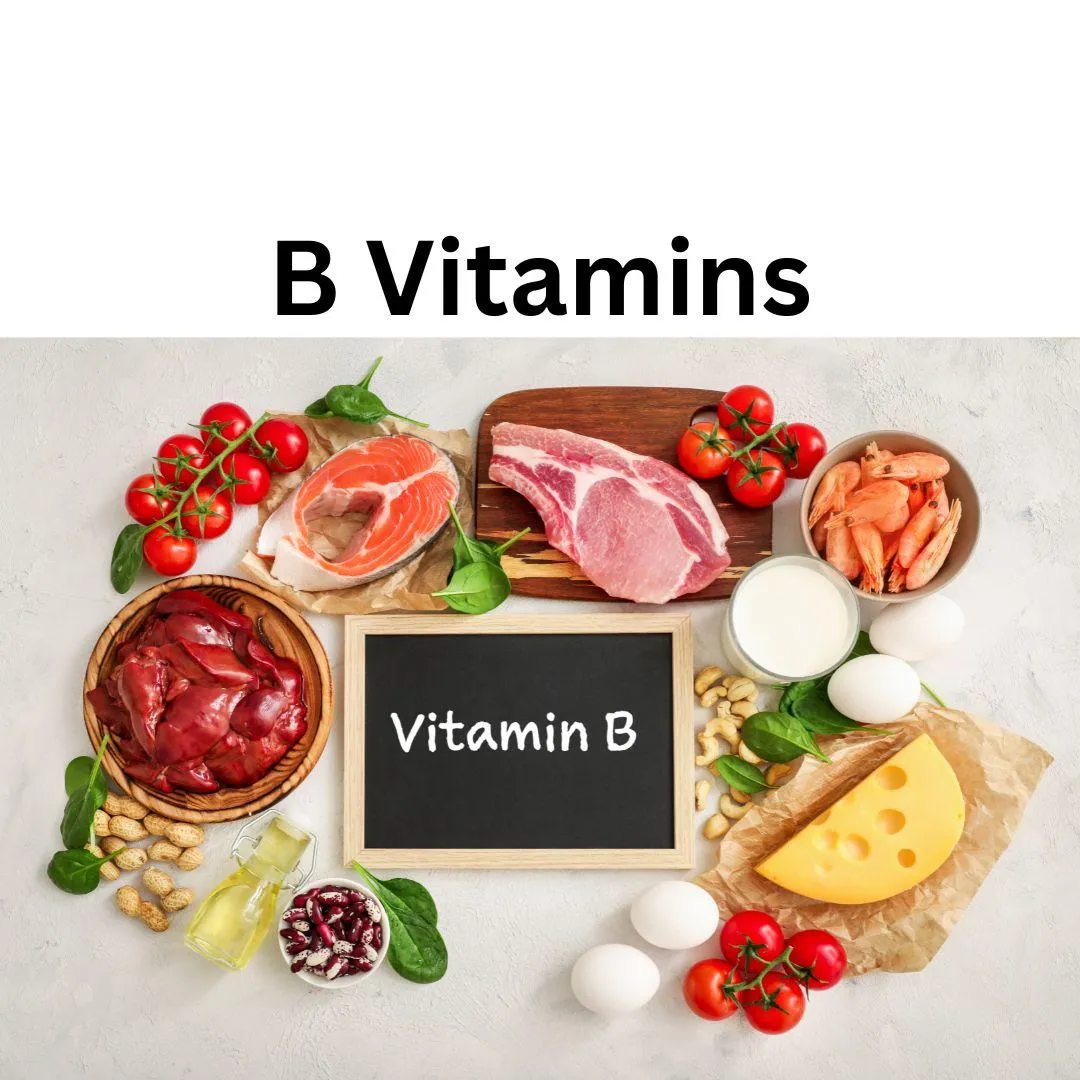*Open to Florida Residents
Blog
Blog

B Vitamins: Essential for Health, Especially for Menopausal Women
B vitamins are a group of water-soluble vitamins crucial for various physiological and metabolic processes in the human body. They play vital roles in energy production, brain function, red blood cell formation and DNA synthesis. Their importance becomes even more important for menopausal women, who face hormonal changes that impact overall health and nutrient needs. In this blog we will delve into the significance of B vitamins, how to obtain them naturally, the role of supplements, the impact of certain foods on their absorption, and how genetic variations like MTHFR mutation can influence B vitamin metabolism.
Understanding the B vitamins and their roles:
There are eight B vitamins, each with distinct yet interrelated roles:
B1 (Thiamine): Essential for converting carbohydrates into energy and maintaining nerve function.
B2 (Riboflavin): Supports energy production, skin health, and the metabolism of fats, drugs, and steroids.
B3 (Niacin): Important for digestive health, skin, and converting food into energy.
B5 (Pantothenic Acid): Crucial for synthesizing coenzymes A, which helps metabolize fatty acids and carbohydrates.
B6 (Pyridoxine): Vital for protein metabolism, cognitive development, and neurotransmitter production.
B7 (Biotin): Necessary for fat and carbohydrate metabolism and healthy hair, skin and nails.
B9 (Folate or Folic Acid): Plays a role in DNA synthesis, cell division, and red blood cell production.
B12 (Cobalamin): Essential for nerve function, red blood cell formation, and DNA synthesis.
Each of these vitamins contributes to overall health, but their importance is amplified during menopause due to the physiological demands and hormonal fluctuations women experience.
Why are B Vitamins Important for Menopausal Women?
Menopause is characterized by a decline in estrogen and progesterone levels, leading to various symptoms such as hot flashes, mood swings, fatigue, and an increased risk of osteoporosis and cardiovascular disease. B vitamins can help mitigate some of these effects:
Energy and Fatigue: B1, B2, B3, and B5 are involved in energy production. Adequate intake can combat menopause-related fatigue.
Cognitive Health: B6, B9, and B12 are critical for brain health and can help reduce the risk of cognitive decline.
Bone Health: Folate and B12 play a role in homocysteine metabolism. Elevated homocysteine levels are linked to bone density loss.
Heart Health: B vitamins help lower homocysteine levels, reducing the risk of cardiovascular disease.
Mood Regulation: B6 aids in serotonin production, helping to alleviate mood swings and depression.
What are some natural sources of B Vitamins?
Obtaining B vitamins through a balanced diet is ideal as it ensures proper nutrient absorption and minimizes the risk of overdosing.
Best Food Sources for B Vitamins:
B1 (Thiamine): Whole grains with the bran and germ intact, nuts, seeds pork, and legumes.
B2 (Riboflavin): Dairy products, eggs, lean meats, green leafy vegetables, and fortified cereals.
B3 (Niacin): Poultry, fish, peanuts, mushrooms, and enriched bread.
B5 (Pantothenic Acid): Avocados, broccoli, sweet potatoes, whole grains and chicken.
B6 (Pyridoxine): Bananas, potatoes, spinach, chicken and fish.
B7 (Biotin): Eggs, nuts, seeds, and liver.
B9 (Folate): Leafy greens, asparagus, oranges, beans, and fortified grains.
B12 (Cobalamin): Found exclusively in animal products like meat, fish, eggs and dairy.
Challenges with Diet: While most individuals can meet their B vitamin needs through food, factors like poor diet, food intolerances, and age-related absorption issues can create deficiencies. Also, different diet trends can make a difference in the types of B vitamins one is exposed to such as a pure vegetarian diet may have limited B12 exposure.
Foods that Block B Vitamin Absorption:
Certain foods and compounds can interfere with the absorption of B vitamins: Phytates: Found in whole grains and legumes, these compounds can bind to B vitamins and minerals, reducing their bioavailability.
Alcohol: Excessive alcohol consumption inhibits the absorption of B1, B6 and B12.
Processed Foods: High sugar and refined products often lack essential nutrients and can impair absorption indirectly.
Antinutrients: Tannins in tea and coffee may interfere with the absorption of certain B vitamins.
Soaking, fermenting, or sprouting grains and legumes can reduced phytate levels and improve nutrient absorption.
Are Supplements Important:
For many menopausal women, diet alone may not suffice, especially if absorption is impaired or if dietary restrictions exist. Supplements can fill these gaps.
When are supplements necessary?
Dietary restrictions: Vegans and vegetarians may need B12 supplements as it is primarily found in animal products.
Absorption Issues: Aging and conditions like atrophic gastritis can reduce B12 absorption.
Increased Demand: Menopausal women may have higher requirements for certain B vitamins.
Best Supplement Practices:
Balanced B- Complex: Provides all eight B vitamins in appropriate ratios.
Methylated Forms: For individuals with genetic variants like MTHFR, methylated B vitamins such as Methylfolate, Methylcobalamin, ensure better absorption and utilization.
Quality Assurance: Choose supplements that are third party tested for purity and potency. It is important to check the labels.
If you are having trouble getting your B-vitamins absorbed, you may have the MTHFR variant. The MTHFR (methylenetetrahydrofolate reductase) gene produces an enzyme essential for processing folate and converting homocysteine to methionine. Variants in this gene can impair this process, leading to elevated homocysteine levels and reduced folate activity.
How this effects B vitamin metabolism is by reducing folate activity, individuals with the MTHFR variant may require methylated folate (L-Methyl folate) instead of folic acid. Without the methylation process then B12 deficiency may occur. Plus elevated homocysteine levels are associated with cardiovascular disease, cognitive decline and pregnancy complications.
What supplements are for people with the MTHFR variant?
Methyl folate
Methyl cobalamin
B vitamins are important for maintaining health, particularly for menopausal women facing unique challenges due to hormonal changes. While a balanced diet rich in whole natural foods is the best way to obtain these nutrients, supplements can play a crucial role for those with increased needs, absorption issues, or genetic variant like MTHFR. By understanding the sources, roles, and potential barriers to B vitamin absorption, you can take proactive steps to optimize your health and wellbeing during menopause and beyond.
Disclaimer:
This content is for informational and educational purposes only. It is not intended to provide medical advice or to take the place of medical advice or treatment from a personal health care professional. All viewers of this content are advised to consult their own qualified health professionals regarding specific health questions. Neither Vivien Murphy, or Elite Sexual Hormone Health takes responsibility for possible health consequences of any person or persons reading or following the information in this educations content. All viewers of this content, especially those taking prescription or over the counter medications should consult their medical providers before beginning any nutrition, supplement or lifestyle program.

B Vitamins: Essential for Health, Especially for Menopausal Women
B vitamins are a group of water-soluble vitamins crucial for various physiological and metabolic processes in the human body. They play vital roles in energy production, brain function, red blood cell formation and DNA synthesis. Their importance becomes even more important for menopausal women, who face hormonal changes that impact overall health and nutrient needs. In this blog we will delve into the significance of B vitamins, how to obtain them naturally, the role of supplements, the impact of certain foods on their absorption, and how genetic variations like MTHFR mutation can influence B vitamin metabolism.
Understanding the B vitamins and their roles:
There are eight B vitamins, each with distinct yet interrelated roles:
B1 (Thiamine): Essential for converting carbohydrates into energy and maintaining nerve function.
B2 (Riboflavin): Supports energy production, skin health, and the metabolism of fats, drugs, and steroids.
B3 (Niacin): Important for digestive health, skin, and converting food into energy.
B5 (Pantothenic Acid): Crucial for synthesizing coenzymes A, which helps metabolize fatty acids and carbohydrates.
B6 (Pyridoxine): Vital for protein metabolism, cognitive development, and neurotransmitter production.
B7 (Biotin): Necessary for fat and carbohydrate metabolism and healthy hair, skin and nails.
B9 (Folate or Folic Acid): Plays a role in DNA synthesis, cell division, and red blood cell production.
B12 (Cobalamin): Essential for nerve function, red blood cell formation, and DNA synthesis.
Each of these vitamins contributes to overall health, but their importance is amplified during menopause due to the physiological demands and hormonal fluctuations women experience.
Why are B Vitamins Important for Menopausal Women?
Menopause is characterized by a decline in estrogen and progesterone levels, leading to various symptoms such as hot flashes, mood swings, fatigue, and an increased risk of osteoporosis and cardiovascular disease. B vitamins can help mitigate some of these effects:
Energy and Fatigue: B1, B2, B3, and B5 are involved in energy production. Adequate intake can combat menopause-related fatigue.
Cognitive Health: B6, B9, and B12 are critical for brain health and can help reduce the risk of cognitive decline.
Bone Health: Folate and B12 play a role in homocysteine metabolism. Elevated homocysteine levels are linked to bone density loss.
Heart Health: B vitamins help lower homocysteine levels, reducing the risk of cardiovascular disease.
Mood Regulation: B6 aids in serotonin production, helping to alleviate mood swings and depression.
What are some natural sources of B Vitamins?
Obtaining B vitamins through a balanced diet is ideal as it ensures proper nutrient absorption and minimizes the risk of overdosing.
Best Food Sources for B Vitamins:
B1 (Thiamine): Whole grains with the bran and germ intact, nuts, seeds pork, and legumes.
B2 (Riboflavin): Dairy products, eggs, lean meats, green leafy vegetables, and fortified cereals.
B3 (Niacin): Poultry, fish, peanuts, mushrooms, and enriched bread.
B5 (Pantothenic Acid): Avocados, broccoli, sweet potatoes, whole grains and chicken.
B6 (Pyridoxine): Bananas, potatoes, spinach, chicken and fish.
B7 (Biotin): Eggs, nuts, seeds, and liver.
B9 (Folate): Leafy greens, asparagus, oranges, beans, and fortified grains.
B12 (Cobalamin): Found exclusively in animal products like meat, fish, eggs and dairy.
Challenges with Diet: While most individuals can meet their B vitamin needs through food, factors like poor diet, food intolerances, and age-related absorption issues can create deficiencies. Also, different diet trends can make a difference in the types of B vitamins one is exposed to such as a pure vegetarian diet may have limited B12 exposure.
Foods that Block B Vitamin Absorption:
Certain foods and compounds can interfere with the absorption of B vitamins: Phytates: Found in whole grains and legumes, these compounds can bind to B vitamins and minerals, reducing their bioavailability.
Alcohol: Excessive alcohol consumption inhibits the absorption of B1, B6 and B12.
Processed Foods: High sugar and refined products often lack essential nutrients and can impair absorption indirectly.
Antinutrients: Tannins in tea and coffee may interfere with the absorption of certain B vitamins.
Soaking, fermenting, or sprouting grains and legumes can reduced phytate levels and improve nutrient absorption.
Are Supplements Important:
For many menopausal women, diet alone may not suffice, especially if absorption is impaired or if dietary restrictions exist. Supplements can fill these gaps.
When are supplements necessary?
Dietary restrictions: Vegans and vegetarians may need B12 supplements as it is primarily found in animal products.
Absorption Issues: Aging and conditions like atrophic gastritis can reduce B12 absorption.
Increased Demand: Menopausal women may have higher requirements for certain B vitamins.
Best Supplement Practices:
Balanced B- Complex: Provides all eight B vitamins in appropriate ratios.
Methylated Forms: For individuals with genetic variants like MTHFR, methylated B vitamins such as Methylfolate, Methylcobalamin, ensure better absorption and utilization.
Quality Assurance: Choose supplements that are third party tested for purity and potency. It is important to check the labels.
If you are having trouble getting your B-vitamins absorbed, you may have the MTHFR variant. The MTHFR (methylenetetrahydrofolate reductase) gene produces an enzyme essential for processing folate and converting homocysteine to methionine. Variants in this gene can impair this process, leading to elevated homocysteine levels and reduced folate activity.
How this effects B vitamin metabolism is by reducing folate activity, individuals with the MTHFR variant may require methylated folate (L-Methyl folate) instead of folic acid. Without the methylation process then B12 deficiency may occur. Plus elevated homocysteine levels are associated with cardiovascular disease, cognitive decline and pregnancy complications.
What supplements are for people with the MTHFR variant?
Methyl folate
Methyl cobalamin
B vitamins are important for maintaining health, particularly for menopausal women facing unique challenges due to hormonal changes. While a balanced diet rich in whole natural foods is the best way to obtain these nutrients, supplements can play a crucial role for those with increased needs, absorption issues, or genetic variant like MTHFR. By understanding the sources, roles, and potential barriers to B vitamin absorption, you can take proactive steps to optimize your health and wellbeing during menopause and beyond.
Disclaimer:
This content is for informational and educational purposes only. It is not intended to provide medical advice or to take the place of medical advice or treatment from a personal health care professional. All viewers of this content are advised to consult their own qualified health professionals regarding specific health questions. Neither Vivien Murphy, or Elite Sexual Hormone Health takes responsibility for possible health consequences of any person or persons reading or following the information in this educations content. All viewers of this content, especially those taking prescription or over the counter medications should consult their medical providers before beginning any nutrition, supplement or lifestyle program.
Let me help you achieve your goals.
Disclaimer: We understand that every individual's experience is unique and results may vary depending on various factors, such as attitude, adaptability, personal history, and overall health. For your safety and well-being, we highly recommend consulting your physician before beginning any program. At Elite Sexual Hormone Health, we do not diagnose, treat, or prescribe any medical or psychological disorders. We urge you to seek the care of a qualified physician or psychotherapist if you suffer from any psychological or medical disorder. Thank you for choosing Elite Sexual Hormone Health as your partner in your journey towards wellness.
© 2025, Elite Sexual Hormone Health. All rights reserved.
Privacy Policy | Terms of Service | Disclaimer
© 2025, Elite Sexual Hormone Health. All rights reserved.
Website by Hypnotherapy Accelerator





